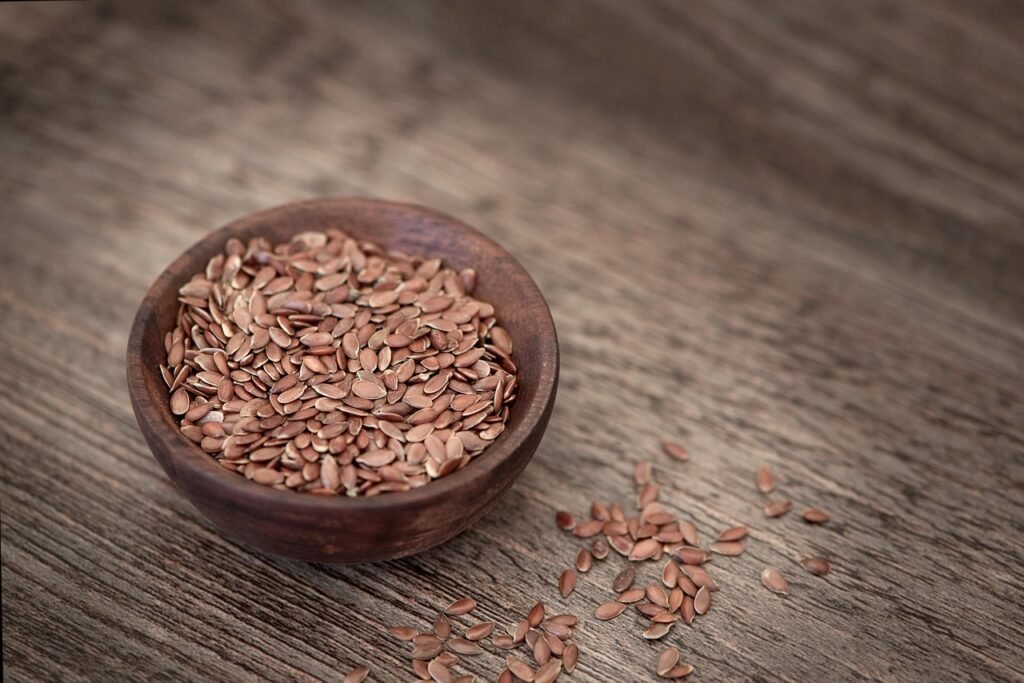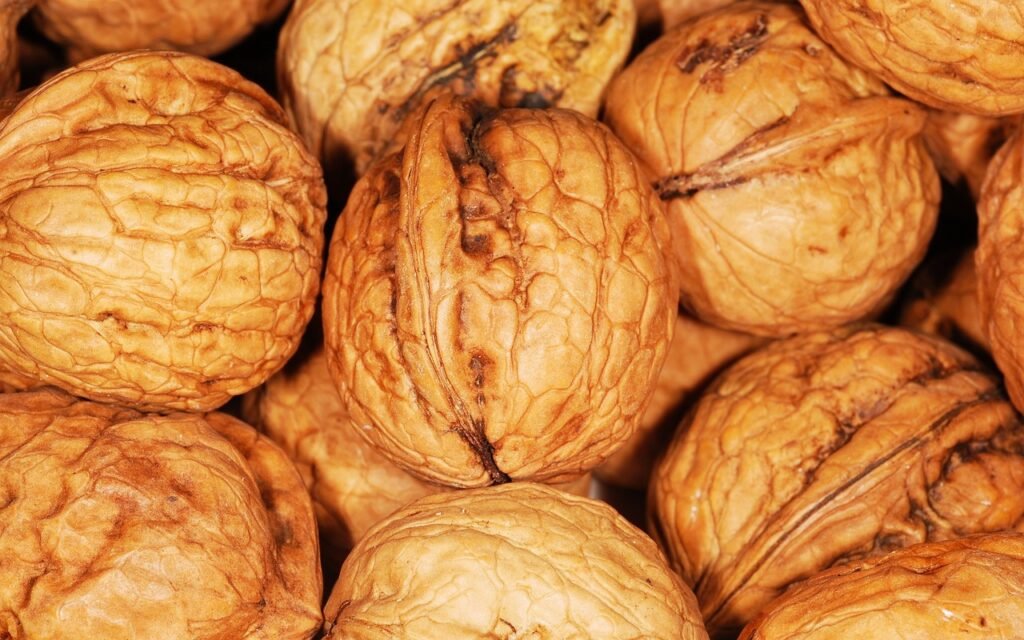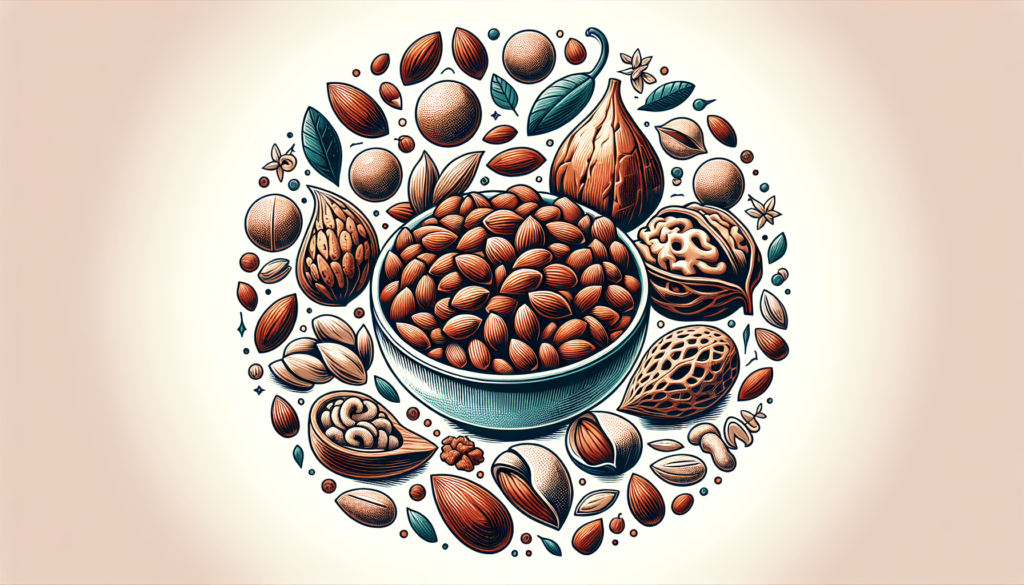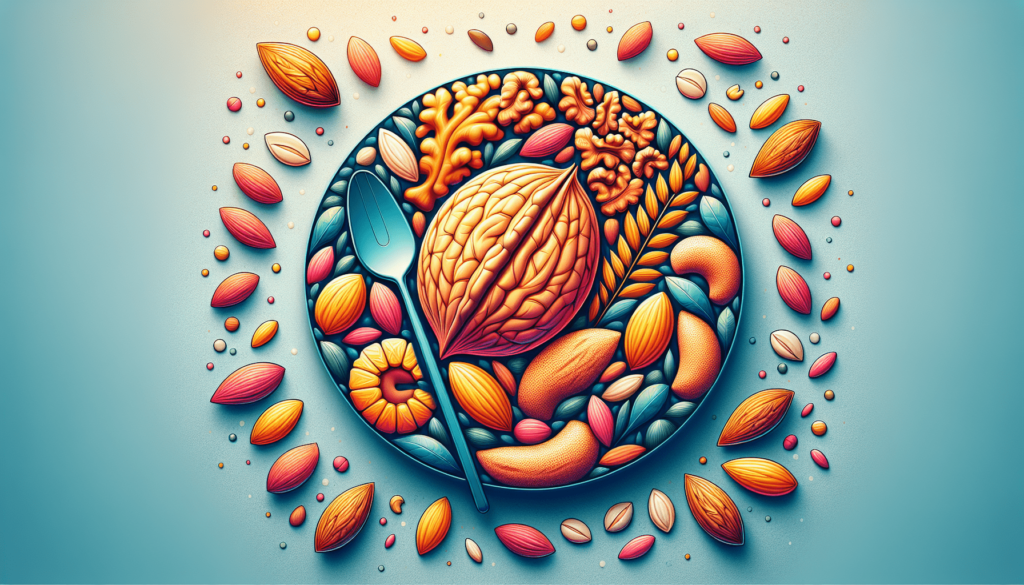In this article, we will explore the fascinating role that nuts and seeds play in promoting satiety and aiding weight management, all within the context of nurturing a healthy gut. By delving into the remarkable benefits that these tiny powerhouses offer, we will discover how they can satisfy your hunger, help you maintain a healthy weight, and support the overall wellbeing of your gut. So, let’s embark on a journey to uncover the secrets of these nature’s treasures, and learn how including nuts and seeds in your diet can positively impact your health and happiness.

This image is property of pixabay.com.
Nutritional Composition of Nuts and Seeds
Nuts and seeds are packed with essential nutrients that contribute to a well-balanced diet. They are a great source of macronutrients, including healthy fats, proteins, and dietary fiber. These nutrients play a vital role in maintaining overall health and wellness.
Macronutrients
Nuts and seeds are known for their high-fat content, but it’s important to note that these fats are predominantly healthy unsaturated fats. These fats provide essential fatty acids, such as omega-3 and omega-6, which are crucial for brain function and heart health. Incorporating nuts and seeds into your diet can help meet your body’s fat requirements and ensure you’re consuming the right types of fats.
Fiber Content
Fiber is a key component of nuts and seeds that promotes satiety and supports digestive health. These tiny powerhouses are rich in both soluble and insoluble fibers, which have numerous benefits. Soluble fiber forms a gel-like substance that slows down digestion, making you feel fuller for longer. Insoluble fiber, on the other hand, adds bulk to stools and aids in regular bowel movements. Including nuts and seeds in your diet can significantly boost your fiber intake and support a healthy digestive system.
Micronutrients
In addition to macronutrients, nuts and seeds are also abundant in essential micronutrients. They are packed with vitamins and minerals like vitamin E, magnesium, zinc, and calcium, which are crucial for various bodily functions. Vitamin E is a potent antioxidant that protects cells from damage, while magnesium plays a vital role in maintaining healthy bones and muscles. These micronutrients contribute to overall health and well-being, making nuts and seeds a valuable addition to any diet.
Role of Nuts and Seeds in Satiety
The high satiety factor of nuts and seeds makes them an excellent snack or addition to meals for those looking to feel satisfied and prevent overeating.
High Protein Content
One of the reasons nuts and seeds contribute to satiety is their high protein content. Protein is a macronutrient that takes longer to digest compared to carbohydrates and fats. When you consume foods rich in protein, such as nuts and seeds, it triggers the release of satiety hormones, promoting a feeling of fullness and reducing the urge to eat. Including nuts and seeds in your meals and snacks can help curb cravings and promote portion control.
Fiber and Satiety Hormones
The fiber content in nuts and seeds also plays a significant role in satiety. As mentioned earlier, soluble fiber forms a gel-like substance that slows down digestion and prolongs the feeling of fullness. Additionally, fiber stimulates the release of satiety hormones, such as cholecystokinin (CCK) and peptide YY (PYY). These hormones send signals to the brain, signaling that you are satisfied and reducing hunger pangs. By incorporating nuts and seeds into your diet, you can harness the power of fiber to support your satiety and weight management goals.
Sustained Energy Release
Nuts and seeds are a source of sustained energy release, which also contributes to satiety. Unlike refined carbohydrates that can cause a rapid spike in blood sugar levels, the combination of healthy fats, proteins, and fiber in nuts and seeds helps maintain stable blood sugar levels. This sustained energy release helps prevent energy crashes and cravings, keeping you satisfied and energized throughout the day.
Effect of Nuts and Seeds on Gut Health
Maintaining a healthy gut is essential for overall well-being, and nuts and seeds can contribute to digestive health in several ways.
Dietary Fiber and Digestive Health
The abundance of dietary fiber in nuts and seeds is beneficial for digestive health. Fiber acts as a prebiotic, supporting the growth of beneficial bacteria in the gut. These beneficial bacteria, known as probiotics, play a crucial role in maintaining a healthy gut microbiota. By consuming nuts and seeds regularly, you can provide nourishment to these beneficial bacteria, promoting a healthy gut environment.
Prebiotic Properties
In addition to promoting the growth of beneficial bacteria, the fiber in nuts and seeds also has prebiotic properties. Prebiotics are non-digestible components of food that stimulate the growth and activity of beneficial bacteria. By acting as prebiotics, nuts and seeds contribute to a balanced gut microbiota and support optimal digestive health.
Anti-inflammatory Effects
Chronic inflammation in the gut can lead to various digestive issues and contribute to the development of inflammatory bowel diseases like Crohn’s disease and ulcerative colitis. Nuts and seeds have anti-inflammatory properties due to their high content of antioxidants and healthy fats. These anti-inflammatory effects can help reduce gut inflammation, promoting a healthy digestive system.
Impact of Nuts and Seeds on Weight Management
Incorporating nuts and seeds into your diet can have a positive impact on weight management and help achieve and maintain a healthy body weight.
Efficacy of Nuts and Seeds for Weight Loss
Contrary to popular belief, consuming nuts and seeds can actually support weight loss efforts. Although they are calorie-dense, numerous studies have shown that people who include nuts and seeds in their diet tend to have a lower body mass index (BMI) and a lower risk of obesity. This might be attributed to their high satiety factor, which helps control cravings and prevents overeating.
Role of Energy Density
Energy density refers to the number of calories in a given volume of food. Nuts and seeds have a relatively high energy density due to their healthy fat content. However, despite their calorie density, research suggests that the human body does not absorb all the calories from nuts and seeds. Some of the calories remain trapped within the fibrous structure of nuts and seeds, making them less bioavailable. This means that although they contain a higher number of calories, your body may not absorb them all, making them an effective tool for weight management.
Effect on Metabolic Rate
Including nuts and seeds in your diet can also have a positive impact on your metabolic rate, which is the rate at which your body burns calories. The protein and healthy fats in nuts and seeds require more energy to digest compared to carbohydrates and fats. This phenomenon, known as the thermic effect of food, can slightly increase your metabolic rate, resulting in a greater calorie burn. While the effect may be modest, every little bit helps when it comes to weight management.

This image is property of pixabay.com.
Nuts and Seeds as Part of a Balanced Diet
When incorporating nuts and seeds into your daily diet, it’s important to consider portion control and how they can be combined with other foods to create a balanced meal or snack.
Portion Control and Caloric Intake
Although nuts and seeds are nutrient-dense and offer numerous health benefits, they are also calorie-dense. It’s crucial to practice portion control to avoid excessive calorie intake. A recommended portion size for nuts and seeds is about 1 ounce or a small handful. By practicing portion control, you can enjoy the benefits of nuts and seeds without sabotaging your overall caloric intake.
Combining Nuts and Seeds with Other Foods
To create a well-rounded and nutritious meal or snack, it’s important to pair nuts and seeds with other food groups. For example, adding nuts to a salad can provide an extra crunch and boost of healthy fats and proteins. Sprinkling seeds over yogurt or oatmeal can enhance the nutritional value and add additional texture. By combining nuts and seeds with other foods, you can ensure a more balanced intake of macronutrients, vitamins, and minerals.
Healthy Meal and Snack Ideas
Incorporating nuts and seeds into your daily meals and snacks can be both delicious and nutritious. Here are some ideas to inspire you:
- Breakfast: Top your morning oatmeal with a sprinkle of walnuts, chia seeds, and a drizzle of honey for added crunch and nutrients.
- Lunch: Add a handful of almonds to your salad or mix pumpkin seeds into your homemade coleslaw for an extra nutrient boost.
- Snack: Enjoy a small handful of cashews or grab a pre-portioned nut and seed mix for a satisfying and energizing snack.
- Dinner: Use ground flaxseed as a coating for baked chicken or salmon for added omega-3 fatty acids and a delightful crunchy texture.
By incorporating nuts and seeds into your meals and snacks, you can enhance the nutritional content and add a delightful touch to your culinary creations.
Potential Risks and Considerations
While the benefits of nuts and seeds are significant, there are a few considerations and potential risks to keep in mind.
Allergies and Nut Sensitivity
Nuts and seeds are common allergens, and some individuals may be allergic or have sensitivity to specific types. It’s crucial to be aware of any allergies or sensitivities you may have and avoid consuming those nuts or seeds. If you suspect an allergy or sensitivity, consult with a healthcare professional for proper diagnosis and guidance.
High Caloric Density
As mentioned earlier, nuts and seeds are calorie-dense due to their healthy fat content. While they can be a valuable addition to a balanced diet, it’s important to be mindful of your overall caloric intake. Snacking on large quantities of nuts and seeds without considering portion sizes can lead to excessive calorie consumption, which may contribute to weight gain.
Fungal Contamination
Nuts and seeds have a higher likelihood of fungal contamination compared to other food groups. Mold and aflatoxins, a group of toxic compounds produced by certain fungi, can be present in nuts and seeds, especially if they are not stored properly or are past their expiration date. To minimize the risk of fungal contamination, make sure to store nuts and seeds in a cool, dry place and discard any that have an off smell or appearance.

This image is property of pixabay.com.
Recommendations and Best Practices
To reap the full benefits of nuts and seeds and minimize potential risks, it’s important to follow these recommendations and best practices:
Incorporating Nuts and Seeds into the Diet
Include a variety of nuts and seeds in your daily diet to benefit from their diverse nutrient profiles. Aim for a serving size of about 1 ounce or a small handful per day. This will provide you with a balanced intake of healthy fats, proteins, fiber, vitamins, and minerals.
Choosing the Right Types and Varieties
There are countless types and varieties of nuts and seeds available, each with its unique nutritional profile. To maximize the health benefits, choose a variety of options and incorporate them into your diet rotation. For example, try almonds, walnuts, cashews, pumpkin seeds, chia seeds, and flaxseeds to enjoy a range of flavors and nutritional benefits.
Consulting with a Healthcare Provider
If you have any underlying health conditions or concerns, it’s always best to consult with a healthcare provider or registered dietitian before making significant changes to your diet. They can provide individualized guidance and support to help you incorporate nuts and seeds in a way that aligns with your overall health goals.
Research and Evidence
Numerous studies have explored the relationship between nuts, seeds, satiety, weight management, and gut health. These studies provide robust evidence supporting the inclusion of nuts and seeds in a well-balanced diet.
Studies on Nuts, Seeds, Satiety, and Gut Health
Research has shown that consuming nuts and seeds can increase feelings of satiety and promote weight management. A study published in “The American Journal of Clinical Nutrition” found that participants who consumed almonds as a snack experienced increased feelings of fullness and reduced hunger compared to those who consumed a high-carbohydrate snack. Furthermore, a study conducted at Purdue University demonstrated that including nuts in meals can increase the feeling of fullness and lead to reduced calorie intake throughout the day.
Clinical Trials on Weight Management
Clinical trials have also supported the potential benefits of nuts and seeds for weight management. A randomized controlled trial published in “Nutrition Journal” found that participants who included nuts in their diets over a 12-week period experienced significant decreases in body weight and body mass index compared to those who did not consume nuts. Another study published in “The New England Journal of Medicine” concluded that the consumption of nuts was inversely associated with weight gain and obesity development over a four-year period.
Emerging Research on Gut Microbiota
Emerging research suggests that nuts and seeds have a positive impact on gut microbiota, which plays a crucial role in overall health. Studies have shown that regularly consuming nuts and seeds can increase the diversity of beneficial bacteria in the gut. A study published in “The Journal of Nutritional Biochemistry” found that adding walnuts to a high-fat diet positively influenced gut microbiota composition in mice, reducing the abundance of harmful bacteria and promoting the growth of beneficial bacteria.

Conclusion
Nuts and seeds are nutritional powerhouses that offer a multitude of benefits for satiety, weight management, and gut health. They provide essential macronutrients, fiber, and micronutrients, supporting overall well-being. Incorporating nuts and seeds into your diet can promote feelings of satiety, aid in weight management, improve digestive health, and contribute to a balanced diet. However, it’s essential to consider portion control, choose the right types and varieties, and consult with a healthcare provider if necessary. With these considerations in mind, nuts and seeds can be a valuable addition to your daily diet, enhancing both taste and nutrition.
References
(Add references here, following the appropriate citation format)


